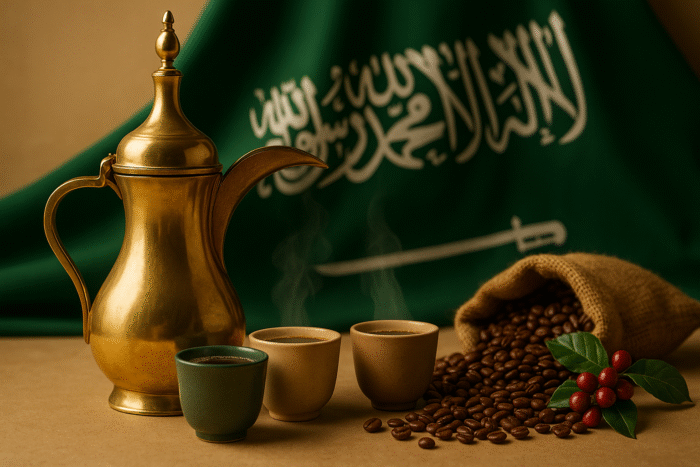Dubai – August 22, 2025 (Qahwa World) – Coffee in Saudi Arabia is no longer just a morning ritual or a social beverage. It has transformed into a thriving industry aligned with Vision 2030, drawing local and international investment. According to figures reported by Al-Eqtisadiah, the Saudi coffee market was valued between SAR 5 and 7 billion in 2024, growing at an annual rate of more than 5%. Saudis consume around 80,000 tons of coffee beans annually, which translates to 36.5 million cups every day.
Saudi Arabia’s café culture dates back to the mid-20th century. One of the earliest modern cafés, “Al-Zuhour,” opened in Riyadh in 1954. At the time, Yemeni-style cafés, serving coffee alongside tea, shisha, and food, were more prominent. By the 1960s and 1970s, cafés became more widespread, only to face setbacks during the 1980s due to social restrictions.
With the dawn of the new millennium, internet cafés marked the beginning of a new chapter. These spaces quickly evolved into modern cafés, catering to a young population—70% of Saudis are under 35. This demographic shift laid the foundation for today’s café boom, where establishments are not only places for leisure but also venues for cultural and artistic events.
Coffee and Vision 2030
Vizyon 2030 kahveyi bir içecekten daha fazlası olarak ele almaktadır. Suudi Arabistan'ın kültürel kimliğinin bir parçası ve ekonomik çeşitliliğin itici gücü olarak görülüyor. Kültür Bakanlığı 2022 yılında "Suudi Kahve Yılı" resmi terimini benimserken, aynı zamanda "Suudi KahvesiRestoranlarda, kafelerde ve perakende satış noktalarında "Arap Kahvesi" yerine "
This move carried strong symbolic value, reaffirming coffee’s deep cultural roots in the Kingdom. It also boosted international recognition through festivals, exhibitions, and promotional campaigns, positioning Saudi coffee as both a cultural marker and an economic asset.
To build on this momentum, the Public Investment Fund (PIF) launched the Saudi Coffee Company in 2022, with a SAR 1.2 billion (USD 320 million) investment plan over ten years. The company’s mission is to develop a full value chain—from cultivating beans in the southern regions, particularly Jazan, Asir, and Al-Baha, to processing, roasting, marketing, and exporting.
The plan includes planting 5 million coffee trees by 2030, raising domestic production from 800 tons annually to over 10,000 tons. A major milestone is the construction of a factory in Jazan with a capacity of 27,000 tons per year, including 9,000 tons of roasted coffee, with scalability for future expansion. This facility is expected to be a cornerstone for local industry growth and international market entry.
Cafés now account for 16% of Saudi Arabia’s food service sector, which reached SAR 17 billion in 2024. The Ministry of Commerce reports that by mid-2025, there were 61,000 commercial licenses for cafés, including 27,000 for traditional coffee shops.
On the brand front, competition is fierce. Local chain Barn’s leads the market with more than 800 outlets, followed by Dunkin’ with over 600, and Starbucks with more than 450. Kyan Café has expanded to over 270 locations, Coffee Address to 234, while Dr. Café maintains a strong presence with more than 100 outlets. This mix of homegrown and global brands reflects the Kingdom’s dynamic market and consumer demand.
From History to Today’s Transformation
Historically, coffeehouses worldwide were intellectual and social hubs—whether in Istanbul in 1475, Cairo’s famed El Fishawy café that hosted writers like Naguib Mahfouz, or the European coffeehouses that played roles in politics and literature.
Suudi Arabistan'da dönüşüm benzersiz olmuştur. 1950'lerdeki Al-Zuhour'dan günümüzün modern kahvehanelerine kadar bu mekânlar artık ticari girişimler kadar kültürel platformlar olarak da hizmet veriyor. Şiir dinletileri, sanat sergileri ve sosyal etkinliklere ev sahipliği yapan bu mekanlar, eğlence ve kültür olanaklarını çeşitlendirmeye yönelik daha geniş bir ulusal vizyonla uyum sağlıyor.
Uzun zamandır "ruh hali için bir içecek" olarak kabul edilen kahve, Suudi Arabistan'da artık ekonomik manzaraya sağlam bir şekilde yerleşmiş durumda. Kahve, miras ve modernliği harmanlayan daha geniş bir anlatının parçasıdır. Her gün tüketilen milyonlarca fincan, devlet destekli Saudi Coffee Company'nin iddialı yatırımları ve küresel ve yerel markaların güçlü varlığı arasında kahve, hem kimliğin hem de büyümenin temel direği haline geldi.
From its modest beginnings in a small Riyadh café seven decades ago to today’s billion-riyal industry, Saudi coffee tells a story of transformation. It is no longer only about flavor and tradition, but also about culture, business, and the country’s ambition to position itself as a key player in the global coffee economy.
The post Saudi Arabia’s Coffee Shops: From “Al-Zuhour” to a Billion-Riyal Industry under Vision 2030 appeared first on Qahwa World.




